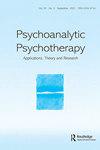Under fire in the consulting room
IF 1.2
Q1 PSYCHOLOGY, PSYCHOANALYSIS
引用次数: 0
Abstract
A slow match is a very slow-burning fuse presenting only a small glowing tip whereas a quick match is one, which once ignited, burns at top speed. In this paper, I will present a number of clinical vignettes to illustrate situations when the therapist realised there was a sudden unexpected rise in ‘temperature’ of a patient’s mind and why this may have occurred. A fuse was lit but was it a slow or a quick one? I will relate this ignition to the possibility of premature interpretations, or a failure to notice how anxious the patient was in the presence of the terrifying object-therapist and also, patients’ unexpected responses to external interferences during a session. Descriptions of how these situations unfolded during sessions are given, and how, upon reflection, these could have been diffused differently. The emphasis will be on how best to maintain a psychoanalytic stance but also how to clinically judge when a session must be terminated in order to protect patient and therapist from exploding ‘bombs’ inadvertently ignited by patient or therapist. The importance of supervision and consultation with colleagues will be stressed.诊室着火了
慢火柴是非常慢燃烧的导火索,只有一个小的发光尖端,而快火柴是一个,一旦点燃,燃烧的速度最快。在本文中,我将展示一些临床小插曲,以说明当治疗师意识到患者的思想“温度”突然意外上升时的情况,以及为什么会发生这种情况。导火索被点燃了,但它是慢的还是快的?我将把这种点火与过早解释的可能性联系起来,或者未能注意到患者在可怕的对象治疗师面前有多焦虑,以及患者在治疗过程中对外部干扰的意外反应。这些情况是如何在会议期间展开的描述,以及如何,经过反思,这些情况可以以不同的方式传播。重点将是如何最好地保持精神分析的立场,以及如何临床判断何时必须终止一个会话,以保护患者和治疗师免受患者或治疗师无意中点燃的爆炸“炸弹”。强调监督和与同事协商的重要性。
本文章由计算机程序翻译,如有差异,请以英文原文为准。
求助全文
约1分钟内获得全文
求助全文
来源期刊

Psychoanalytic Psychotherapy
PSYCHOLOGY, PSYCHOANALYSIS-
CiteScore
1.30
自引率
37.50%
发文量
22
期刊介绍:
Psychoanalytic Psychotherapy publishes original contributions on the application, development and evaluation of psychoanalytic ideas and therapeutic interventions in the public health sector and other related applied settings. The Journal aims to promote theoretical and applied developments that are underpinned by a psychoanalytic understanding of the mind. Its aims are consonant with those of the Association for Psychoanalytic Psychotherapy in the NHS (APP in the NHS) in promoting applied psychoanalytic work and thinking in the health care system, across the whole age range.
 求助内容:
求助内容: 应助结果提醒方式:
应助结果提醒方式:


